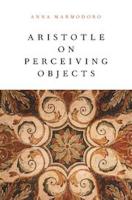
OUP (2014) h/b 291pp £47.99 (ISBN 9780199326006)
The question this book addresses is a simple one. Aristotle’s account of perception describes five senses, each of which is receptive of a different range of perceptible qualities. Sight perceives colours, hearing perceives sounds and so on. But when we perceive, we are not limited in this way. We typically think of ourselves as perceiving objects: we see the sun set, we hear the train arrive, and we smell the turkey cooking. We are aware of the sweetness and the whiteness of the milk as we drink it. How then did Aristotle account for all this?
The short answer is the common sense, which is not a sixth sense but a unity that emerges when the five senses are operative. M. develops this answer over the course of the book relying as much on lesser studied texts in the Parva Naturalia as on the more familiar texts of the De Anima. She presents Aristotle as a pioneer: his extension of his theory of substance to provide a model for the unity of perceptual experience is itself a milestone in the history of the philosophy of mind; yet he goes even further in his treatise On Sleep and makes explicit the way in which this perceptual unity involves more than the special senses operating together. By recognising the problem of how we perceive the sweetness and the whiteness of the milk (so-called cross-modal binding) as well as then offering an innovative solution, Aristotle emerges as a philosopher of the first rank.
The book also offers a useful survey of recent scholarship. The doctrine of the common sense is fiercely debated by Aristotelian scholars, and M. surveys various alternative interpretations and explains with precision how and why she disagrees with them. But M. is also interested in what we can learn from the study of Aristotle to help us deal with today’s concerns. She writes as a philosopher rather than as a philologist, and her attempt to resolve the question takes us into the heart of contemporary metaphysics. For readers like myself not well versed in these debates, this is certainly a challenge but she writes with admirable clarity, unlike Aristotle. In the process she offers at almost every turn bold claims and radical reinterpretations. Unreservedly recommended.
Alan Towey—Holmewold House School
